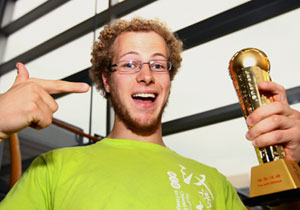 |
| Niko Bell with the trophy he received for making the finals of the TV show, Han yu qiao.(Bruce Bottomley Photo) |
University professors aren’t exactly known for assigning the clichéd ‘How-I-spent-my-summer-vacation’ essay, but if they were, Niko Bell would have the assignment beat.
After all, there aren’t too many students who can claim to be reality TV stars on Chinese television.
Mr. Bell related his summer experiences during the first scheduled talk of the Chinese Studies’ Speaker Series, held Wednesdays from 4 to 5 p.m. in Room 2116 of the Marion McCain Building.
A third-year student studying journalism and international development, Mr. Bell came in first at a Chinese speech competition at McGill University in the spring. That victory won him an all-expenses-paid trip to China and a spot on the TV show Han yu qiao. Translating roughly as ‚ÄúChinese Bridge,‚Äù the show pits university and college students from around the world against each other in a Chinese language competition.Ã˝
|
From Nelson, B.C., Mr. Bell was first introduced to the Chinese language while on a volunteer placement with Gap Canada in China after high school, and extended his stay by spending a semester at a Chinese university and traveling. He has continued his Chinese language study at ¬È∂π¥´√Ω with Prof. Shao-Pin Luo.Ã˝
The 120 contestants from 87 countries were required to prepare speeches and perform a Chinese cultural activity, such as a kung fu demonstration or a recitation of a classical poem. Mr. Bell decided to perform “xiangsheng,” the Chinese version of stand-up comedy.
“It was so big and so sudden that it was hard to even imagine what was happening,” he says, describing four whirlwind weeks in front of TV cameras in a competitive pressure-cooker environment. “We were ferried up to the TV station and did our thing and tried not to think of the millions of people who were watching.”
Mr. Bell was one of the very few Canadians to make the top-30 finals. He says he was almost relieved not to progress further and “was just as happy to watch the rest of competition on the television.”
After being in the public eye and having every moment scheduled, Mr. Bell says it’s cool to be just another student at Dal for the fall. “After being treated like a set piece at a TV station, it’s actually great to be back,” he says.
Ã˝
